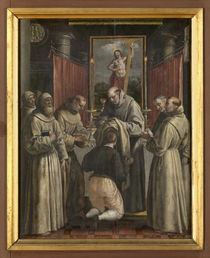The Catholic Defender: Saint Martin I
- Donald Hartley

- Apr 13
- 3 min read
Updated: Apr 14
Deepertruth with special permission and aid with Franiciscan Media, a great team for the Lord

St. Martin I, (born, Todi, Tuscany [Italy]—died September 16, 655, Cherson, Crimea [now Kherson, Ukraine]; feast day April 13), pope from 649 to 653.
When Martin I became pope in 649, Constantinople was the capital of the Byzantine empire and the patriarch of Constantinople was the most influential Church leader in the eastern Christian world. The struggles that existed within the Church at that time were magnified by the close cooperation of emperor and patriarch.
A teaching, strongly supported in the East, held that Christ had no human will. Twice, emperors had officially favored this position: Heraclius by publishing a formula of faith, and Constans II by silencing the issue of one or two wills in Christ.
Elected pope in 649, Martin I had gotten in trouble for refusing to condone silence in the face of wrong. At that time there existed a popular heresy that held that Christ didn't have a human will, only a divine will. The emperor had issued an edict that didn't support Monothelism (as it was known) directly, but simply commanded that no one could discuss Jesus' will at all.
Monothelism was condemned at a council convened by Martin I. The council affirmed, once again, that since Jesus had two natures, human and divine, he had two wills, human and divine. The council then went further and condemned Constans edict to avoid discussion stating, "The Lord commanded us to shun evil and do good, but not to reject the good with the evil."
July 649. Martin’s pontificate occurred during an extensive controversy that had strained relations between the Eastern and Western churches—namely monothelitism, a heresy maintaining that Christ had only one will. To bring an end to the controversy, Martin convoked and presided over the Lateran Council of 649 that condemned monothelitism
Shortly after assuming the office of the papacy—which he did without first being confirmed by the emperor—Martin held a council at the Lateran in which the imperial documents were censured, and in which the patriarch of Constantinople and two of his predecessors were condemned. In response, Constans II first tried to turn bishops and people against the pope.

In his anger at this slap in the face, the emperor sent his soldiers to Rome to bring the pope to him. When Martin I arrived in Constantinople after a long voyage he was immediately put into prison. There he spent three months in a filthy, freezing cell while he suffered from dysentery. He was not allowed to wash and given the most disgusting food. After he was condemned for treason without being allowed to speak in his defense he was imprisoned for another three months.
Martin I lay too sick to fight on a couch in front of the altar when the soldiers burst into the Lateran basilica. He had come to the church when he heard the soldiers had landed. But the thought of kidnapping a sick pope from the house of God didn't stop the soldiers from grabbing him and hustling him down to their ship.
Failing in this and in an attempt to kill the pope, the emperor sent troops to Rome to seize Martin and to bring him back to Constantinople. Already in poor health, Martin offered no resistance, returned with Calliopas, the exarch of Constantinople, and was then submitted to various imprisonments, tortures, and hardships. Although condemned to death and with some of the imposed torture already carried out, Martin was saved from execution by the pleas of a repentant Paul, patriarch of Constantinople, who was himself gravely ill.

Tortures and cruel treatment having taken their toll, Martin died shortly thereafter. He is the last of the early popes to be venerated as a martyr.
From there he was exiled to the Crimea where he suffered from the famine of the land as well as the roughness of the land and its people. But hardest to take was the fact that the pope found himself friendless. His letters tell how his own church had deserted him and his friends had forgotten him. They wouldn't even send him oil or corn to live off of.





















Comments